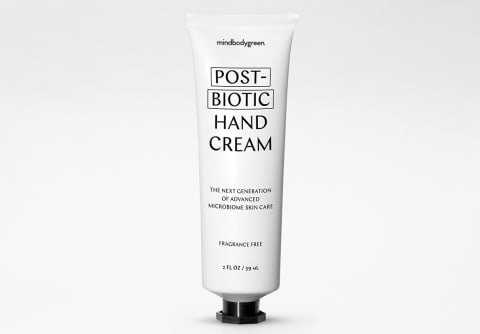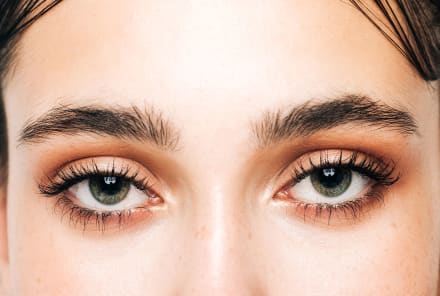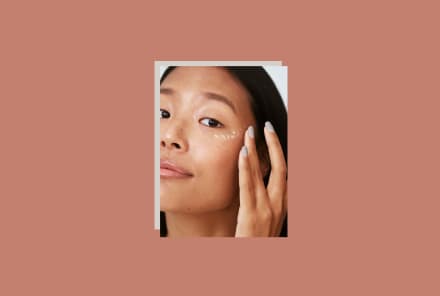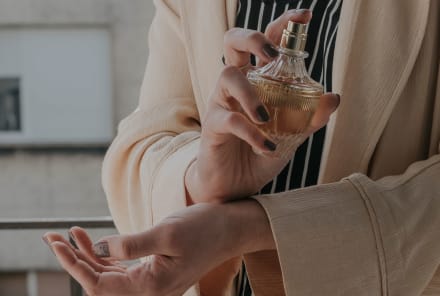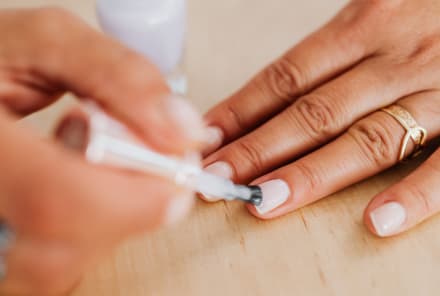Advertisement
How To Stop Biting Nails: 8 Expert Tips To Keep Your Tips Looking Polished

If you're a nail-biter, don't fret. You're not alone. According to one study, 20 to 30% of the population bites their nails1, which means that it's actually a common habit among adults and kids. That's a lot of people left wondering: How do I stop biting my nails?
And even though it's not exactly a harmful habit, if done in excess it can be risky and come with consequences like skin infections or transmission of virus and flu.
We tapped experts to get the scoop on nail-biting, why people bite their nails, if nail-biting is a bad habit, and how to avoid the habit altogether. Keep reading to learn more.
Why do people bite their nails?
Even if you're not one to bite your nails, chances are you probably know someone who does. According to child, adolescent, and adult psychologist Gauri Khurana, M.D., MPH, nail-biting is a self-soothing behavior, just like hair pulling and skin picking.
"These body parts are easy to access, and results are generally not easily visible to others," she says. "The most common reason why people bite their nails is to self-soothe when they are hungry, bored, frustrated or working on difficult tasks."
Essentially, nail-biting is one of those unwanted habits that we don't even know we are doing most of the time.
According to Khurana, nail-biting behaviors can start in childhood, and some research even suggests that it may be genetic. But it's not certain whether this type of behavior is learned and imitated or a built-in innate feature.
Is nail-biting bad?
The jury is still out on this one. A little nibble here or there isn't harmful, but if you're gnawing away until your nails are itty-bitty nubs, infections are definitely possible.
"Chronic nail-biting, also called onychophagia, can damage the skin around the nails and the nails themselves," says board-certified dermatologist Tiffany Jow Libby, M.D. "It can also increase your risk of bacterial nail infections, which can be red, painful, swollen and often require antibiotics to treat."
Not to mention, hands and nails themselves are often more germ-infested than we think, so biting your nails or the skin around the nails can transfer a slew of germs into your mouth, increasing your risk of virus and other infections. Yikes.
8 tips to stop nail-biting
If you're someone who wants to turn around their habits, these expert tips can help:
Identify the triggers
Sounds elementary, but when you're trying to break a habit, the first step is to identify the cause.
If you can pinpoint what causes you to bite your tips, you can aim to put yourself in different situations that help you to avoid the habit. Avoiding these triggers, or finding a way to manage them, can help you keep nail-biting to a minimum, Libby says.
If your picking habit is a conscious behavior that happens when you experience intense negative emotions, "try to understand that something is affecting you in the moment that needs to be released," says Michaela Chatzimanoli, a clinical psychologist at SkinPick.com.
"Bring your attention to your body, then breathe in deeply through your nose and breathe out slowly through your mouth, allowing this release to happen in a different, more caring way," she says.
Keep your hands busy
It's nearly impossible to bite your nails if your hands are at work.
Khurana suggests adopting another comforting behavior that uses your hands. "This can include reading, knitting, crafts, or petting an animal, or a variety of household tasks."
Bonus: You may find that your nail-biting decreases and your productivity increases. That's a win-win in our book.
Wear gloves or mittens
While this isn't possible in every situation, sporting gloves makes nail-biting, well, impossible.
Khurana says even if you can't wear them all day long, wearing them during stressful situations or even boring circumstances can help reduce nail-biting tendencies.
At the very least, try and create a physical barrier—like wearing a bandage over the cuticles you tend to pick.
"If something is covered, then it's hard to access, and when you try to get to them but can't, that's enough time for you to think, Oh, I shouldn't be doing this," says Amy Wechsler, M.D., board-certified dermatologist and psychiatrist. "Sometimes my patients will be walking around with lots of Band-Aids, but it's the only way to heal things."
Keep your nails short
"If you keep your nails short, you'll have less nail to bite, and it can be less tempting," Libby says.
To make things easier for you, make a routine of clipping or grooming your nails regularly to avoid temptation.
And if you want to find a nail shape that works best for yours, see our guide to nail shapes here.
Apply a foul-tasting polish
Both Libby and Khurana agree that applying a bitter-tasting nail polish can also be a deterrent.
These polishes can be purchased over the counter and often don't have color, for those who don't like wearing polish. You'll think twice before nibbling on your tips now.
Chew gum or eat mints
If biting your nails is more of a mouth movement that you desire, keep your mouth busy.
Reach for a delicious chewing gum or mints that will keep you busy for a few moments at a time. These things are inexpensive and easy to pop in your mouth no matter where you are.
Try a mouth guard
Khurana suggests trying a mouth guard or retainer to make it more difficult to bite down.
This is another suggestion that may be best practiced in the comfort of your home but can help eliminate the desire to chew away at your fingernails when you'd be most likely to do so.
Contact an expert
If you've experienced an infection in your skin or nails from biting, Libby suggests contacting your local dermatologist for an evaluation. Your dermatologist can help guide you in a direction to not only treat the infection but can also help to give suggestions on how to eliminate biting altogether.
"If someone is maiming themselves, scarring themselves, having multiple bouts of infections, and still can't stop picking, then that's a problem. There's a positive feedback loop in your brain that has to be broken," says Wechsler.
In these cases, a more significant intervention may be needed, such as cognitive-behavioral therapy (CBT). In broad terms, CBT involves working with a practitioner to identify the thoughts you're having while picking or engaging in any unwanted behavior and replacing them with healthier thoughts.
"But it only works if you're motivated," says Wechsler.
To find a therapist, search the TLC Foundation for Body-Focused Repetitive Behaviors' database.
How to keep hands looking healthy
When you bite your nails, you may find yourself self-conscious about your hands and tips. Here's how you can keep the nails and skin polished:
Get a manicure
Regular manicures can offer you incentives not to nibble away.
If salon visits aren't an option, you can get a salon-grade experience at home, and it's actually much easier than you might think.
Seriously, with a few steps, you can achieve a polished, clean look—see our manicure guide here.
Apply a hand cream
Keep dry hands hydrated with a supple hand cream. When your skin is moisturized, the hands simply look better.
"It's essential to moisturize as often as possible to restore those lipids and encourage the regrowth of healthy bacteria, or your microbiome," board-certified dermatologist Whitney Bowe, M.D., says.
It's especially important after washing your hands or taking a shower: A good cream can seal in that lingering water, restore your skin's lipids, and prevent transepidermal water loss2.
That said, grab a butter-thick occlusive and slather it on whenever your paws need a hit of moisture.
And for those wondering: Yes, you can find a dense cream that doesn't make your hands too greasy. A mix of hydrators and rich butters (think aloe vera paired with shea butter) can keep a cream fast-absorbing while locking in moisture.
Bonus points if your cream contains soothing ingredients known for their anti-inflammatory properties (oat comes to mind), as dry, cracked hands can quickly feel uncomfortable and itchy.
See here for our favorite hand creams for dry skin.
Keep a nail file on hand
If you accidentally start biting midday—it happens!—just file any jagged tips away to keep hands looking fresh.
You'll want to be sure not to "saw" with your file, which can be hard on the nail, but instead gently buff the nail moving in one direction.
The takeaway
Biting nails is totally common—so don't stress if you have the habit. But it's also worth it to try and stop so you don't open your skin up for infection. It's also important to identify why the habit is triggered in the first place, as stress is a very common culprit. If that's the case, check out our favorite stress management techniques.
Watch Next
Enjoy some of our favorite clips from classes
Enjoy some of our favorite clips from classes
What Is Meditation?
Mindfulness/Spirituality | Light Watkins
Box Breathing
Mindfulness/Spirituality | Gwen Dittmar
What Breathwork Can Address
Mindfulness/Spirituality | Gwen Dittmar
The 8 Limbs of Yoga - What is Asana?
Yoga | Caley Alyssa
Two Standing Postures to Open Up Tight Hips
Yoga | Caley Alyssa
How Plants Can Optimize Athletic Performance
Nutrition | Rich Roll
What to Eat Before a Workout
Nutrition | Rich Roll
How Ayurveda Helps Us Navigate Modern Life
Nutrition | Sahara Rose
Messages About Love & Relationships
Love & Relationships | Esther Perel
Love Languages
Love & Relationships | Esther Perel
